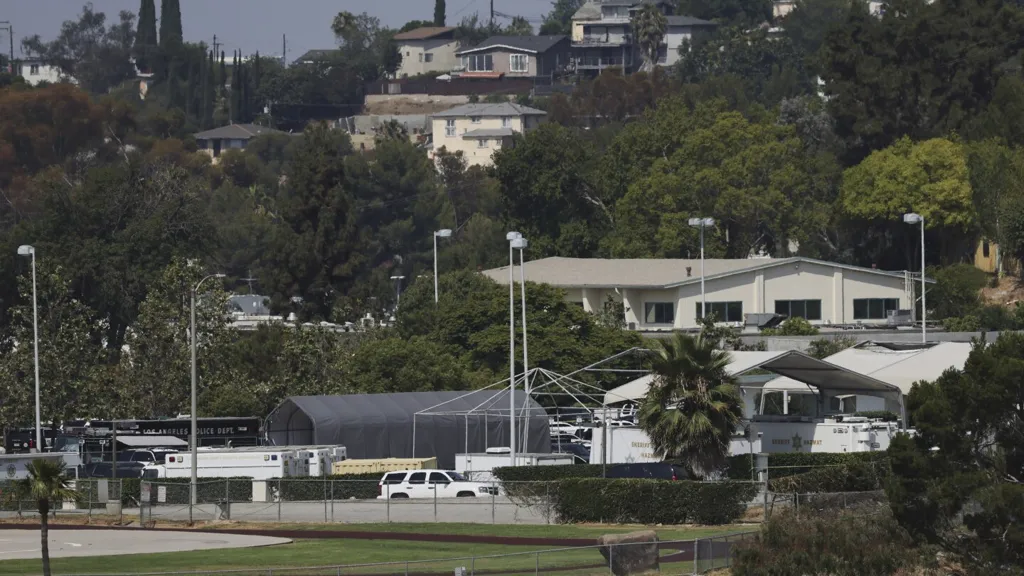Three members of the arson and explosives unit of the Los Angeles County Sheriff's Department were killed Friday in a blast at the department's training facility.
It was not immediately clear what they were doing when the explosion happened in a parking lot at the Biscailuz Training Facility or what caused it. However, an early line of investigation is examining whether it may have been a training accident, according to a law enforcement official briefed on the matter who was not authorized to discuss it publicly and spoke on condition of anonymity.
The detectives who died were part of a team that undergoes in-depth training and responds to more than 1,000 calls a year, according to Sheriff Robert Luna.
What do such units typically do?
Depending on the agency, they can be responsible for everything from bomb disposal to search and prevention operations to arson investigations, according to Mark Lomax, former executive director of the National Tactical Officers Association and a retired major for the Pennsylvania State Police.
In bomb disposal actions, team members might respond to a package or box that could contain an explosive device and then use tools like robots or X-ray devices to "render it safe," Lomax said.
If there is an explosion, members could be sent to investigate, including working to determine the types of materials used to make the bomb, he said. They may also help with search and prevention at big events using bomb sniffing dogs and scanners.
On the fire side of the unit, team members could be responsible for arson investigations, including determining the cause of a fire and whether it was natural or intentional, Lomax said.
How common is it for a law enforcement agency to have a team like this?
Whether or not an agency has such a unit would likely depend on the size of the department and its location.
There are thousands of police departments in the U.S., and the majority of them are under 50 people, according to Lomax. Smaller departments might not have sufficient personnel, money or equipment to have their own explosives team.
"A lot of times, depending on location, they may use the county sheriff's department in certain locations or the state police in other locations," Lomax said.
The team from the Los Angeles County Sheriff's Department would likely be deployed to smaller cities in the county to help with such incidents as suspicious packages or even to educate the community about what to look out for.
What type of training do team members typically undergo?
A certified bomb technician would need to have a certification from the FBI, most likely from its Hazardous Devices School in Huntsville, Alabama, Lomax said.
That training includes threat assessment and puts participants in "true-to-life training settings," according to a video on the FBI's website.
For advanced training, the Bureau of Alcohol, Tobacco, Firearms and Explosives has a national center at the same location, according to Lomax. There is also regional training.
"It's very dangerous, and therefore it demands higher, more advanced training, more advanced equipment," Lomax said.
For arson investigations, officials may go to the National Fire Academy in Maryland or participate in fire investigations training through the Bureau of Alcohol, Tobacco, Firearms and Explosives, according to Lomax. There are also local academies that offer more basic arson investigation courses.
The people on these teams likely were already officers, troopers or deputies and then later took the specialized training, Lomax said.
How dangerous can training be for this type of unit?
Explosives training involving actual explosive devices can be very dangerous because there can be many unknowns, according to Lomax.
Everything from the amount of moisture in the air that day to how long the material has been on the shelf could impact an exercise.
"There's so many different variables that make that type of training extremely, extremely dangerous and hazardous," Lomax said.
He referenced a 2022 incident in which five bomb technicians were injured by the detonation of an explosive device during a training exercise in Pennsylvania conducted by the FBI's Philadelphia field office.
And in 2021, there was a catastrophic explosion in Los Angeles as homemade fireworks were being destroyed by a bomb squad. It injured 17 people and damaged dozens of homes, businesses and vehicles.
